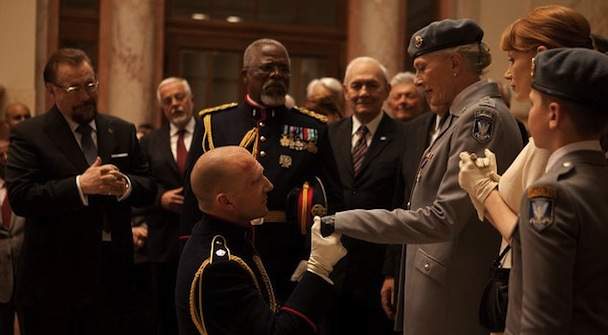Coriolanus
Ralph Fiennes' bold Shakespeare/action movie hybrid is set 'in a place calling itself Rome' but looking like the Balkans.
Overview
What's in a name? He titled Coriolanus by any other name would smell as proud, fierce and crazy scary. This, I'm guessing, would have been a line in Shakespeare's Coriolanus, had he not already used it to prettier effect in Romeo and Juliet. One of the lesser known of the Bard's works, Coriolanus is the story of a heroic Roman general, Caius Martius, who is decorated with the surname of Coriolanus. But when he's unable to translate his prowess for war into political popularity, he loses his title, is exiled from the city and from outside its walls plots his revenge.
Like Baz Luhrmann's Romeo + Juliet and Richard Loncraine's Richard III, this Coriolanus puts Shakespeare's words into a modern context, aiming for accessibility, resonance and impact. Set "in a place calling itself Rome" but looking like the Balkans, the assured directorial debut from Ralph Fiennes pits himself as Coriolanus against Gerard Butler as his mortal foe, Tullus Aufidius, leader of the Volscian army.
Coriolanus is a brazen Shakespeare/action movie hybrid that mostly works and works beautifully. It creates a highly stylised world where grey urbanism butts up against sweat and rawness and tribalism and men lovingly sharpening daggers of medieval thickness and detail. It's certainly redolent of those parts of the world that identify with European cosmopolitanism yet struggle to reconcile it with the barbarism that emerges in enmity. The modern makeover is elegantly done, with newscasts relaying the lines of citizen commentators and bazookas laying waste to apartment blocks that stand in for razed villages.
There are a few moments, however, where the imagery and allegory lose the plot and you wish Fiennes and writer John Longan had thought more laterally about their revision. In particular, one little mob of protesters seems to hound Coriolanus in places (parliaments, TV studios) a mob could not normally be, soon running him out of town. As a representation of how public opinion works, it jars completely. It's disappointing because the whole point of Shakespeare's historical tragedies is to communicate how the lessons of a past event apply to the present, and one slip is enough to pull you out of a near-meticulous world.
Fortunately, these inconsistencies are overcome in a tighter second half. Once Coriolanus is exiled from Rome, things get intense. He forms an alliance with Tullus Aufidius to march on the city that betrayed him, and only the intervention of his devoted (and devotedly militarist) mother (Vanessa Redgrave) and sweet wife (Jessica Chastain) can save the peace.
The real pleasure in Coriolanus is savouring Shakespeare's words in a medium that zooms in close enough for you to properly hear them. They're spectacularly relayed by the impressive cast, whether by Fiennes' theatre-filling intensity or Butler's casual gruffness.





